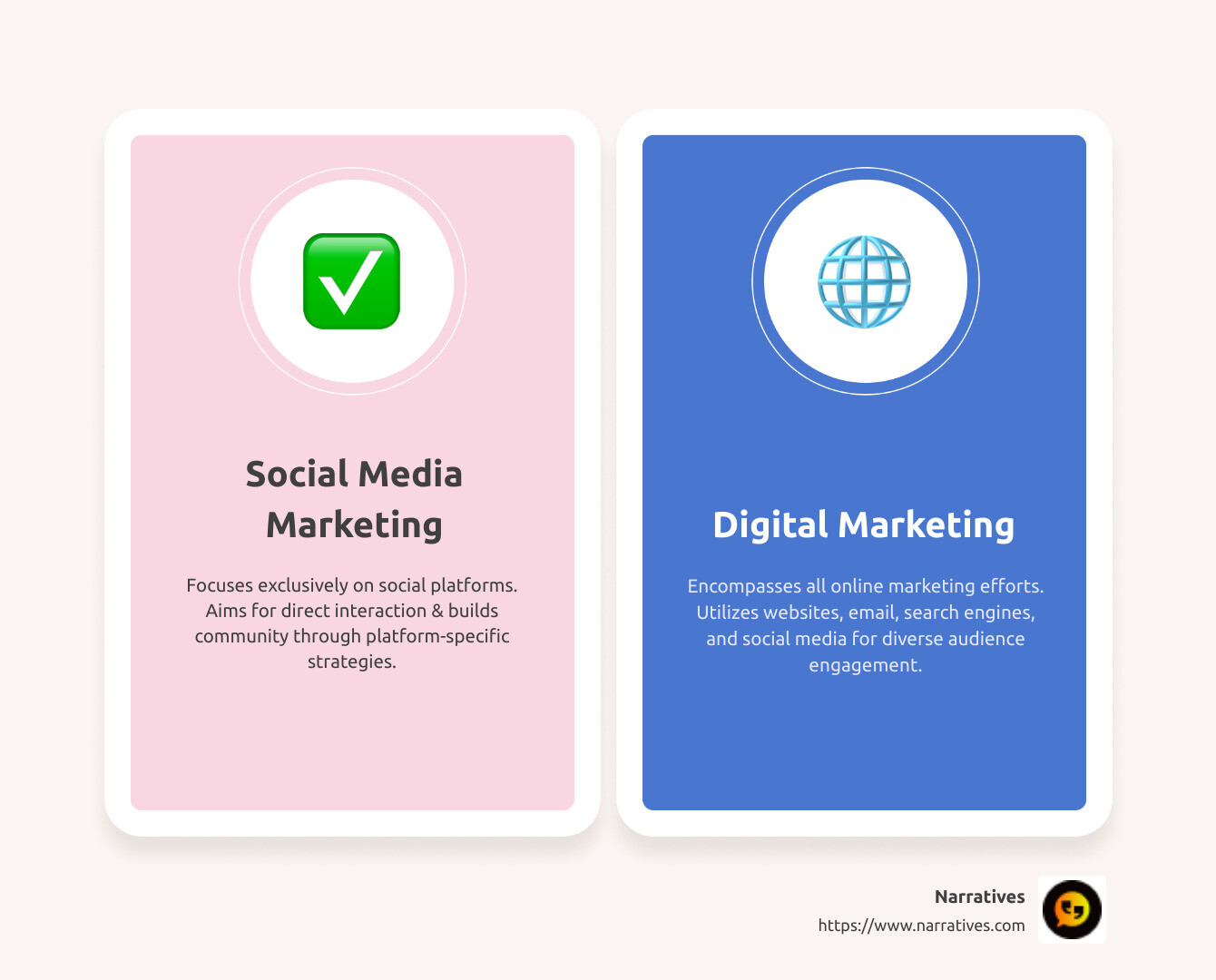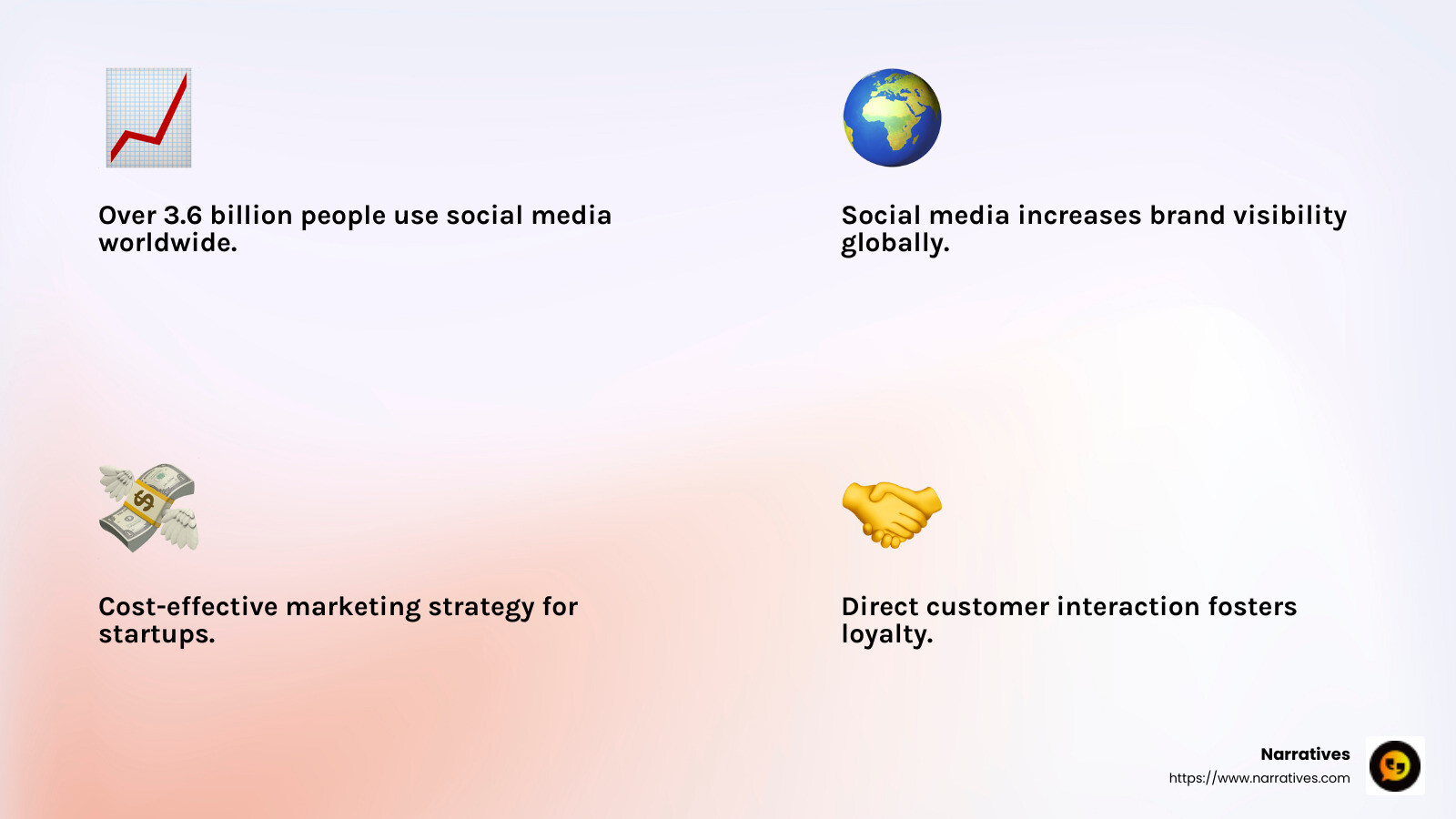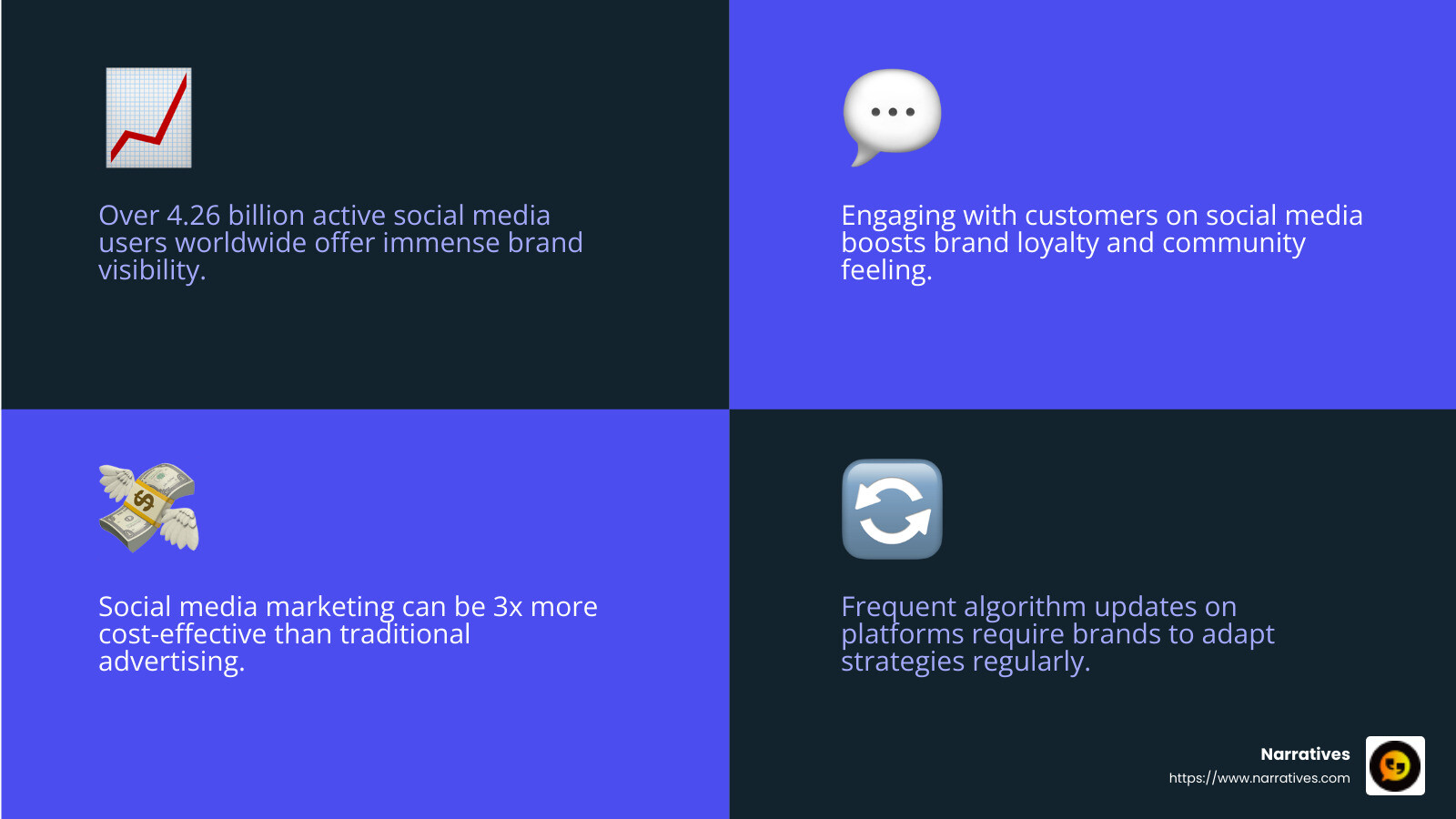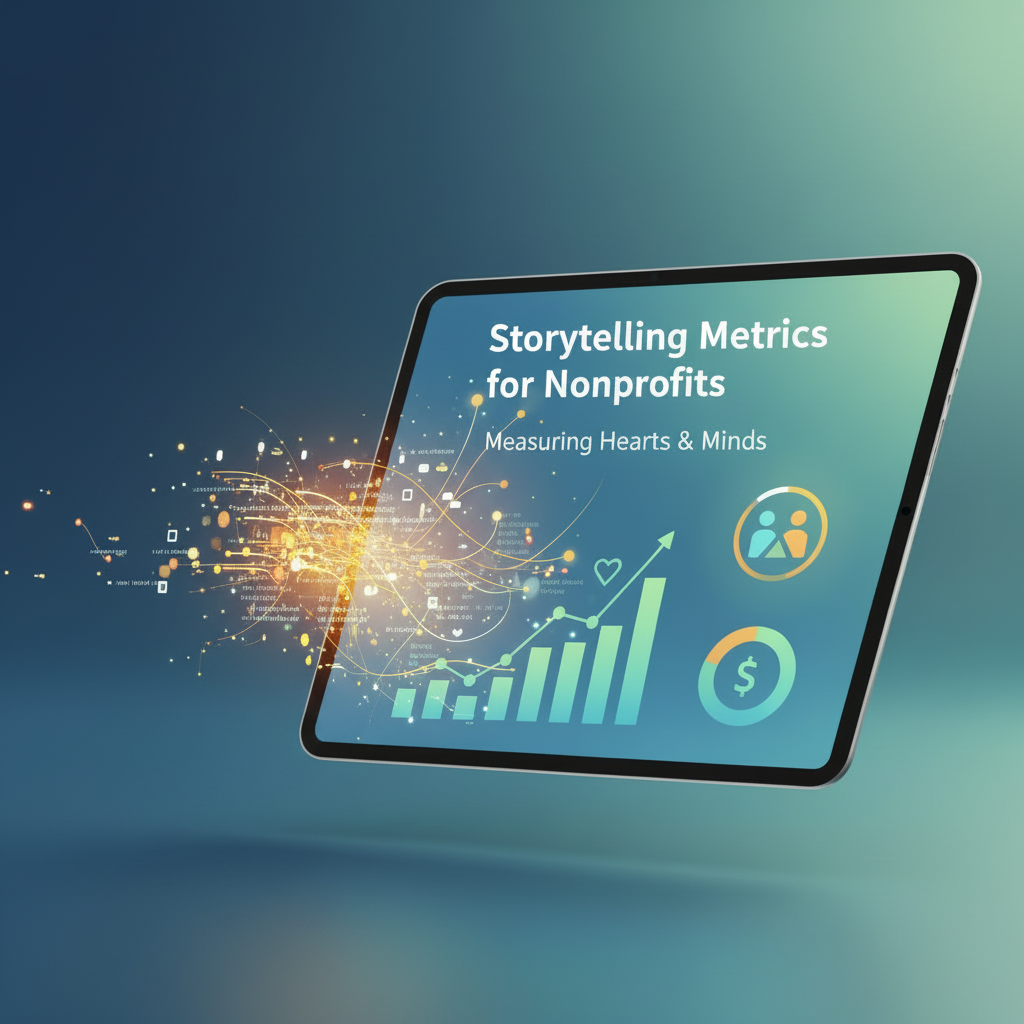Digital Marketing Showdown: Social Media vs. SEO

Social media digital marketing plays a vital role in today’s connected world. Let's break it down quickly:
- Type of Marketing: Social media marketing is a subset of digital marketing.
- Channels: Social media channels like Facebook, Instagram, and Twitter are pivotal for engagement.
- Purpose: Boosts brand awareness and fosters customer loyalty.
Digital marketing goes beyond just social media. It includes strategies like search engine optimization (SEO), email marketing, and content marketing, which form a broader spectrum of online advertising techniques.
Digital Marketing:
- Encompasses all online marketing efforts.
- Uses websites, email, search engines, and social media.
- Engages with audiences across diverse digital channels.
Social Media Marketing:
- Focuses exclusively on social platforms.
- Aims for direct interaction with audiences.
- Builds community and brand engagement through platform-specific strategies.
Both digital marketing and its subset of social media marketing are essential for any brand looking to thrive online. By understanding their unique strengths and challenges, organizations, especially in the non-profit sector, can better target their audiences, tell compelling stories, and drive their missions forward.

Social media digital marketing vocab explained:
- social media marketing solutions
- social media management strategy
- social media marketing agency services
Understanding Social Media Digital Marketing
Social media digital marketing is a game-changer. It uses platforms like Facebook, Instagram, and Twitter to connect with audiences. Let's explore its key benefits and challenges.
Key Benefits
1. Brand Awareness: Social media is a powerful tool for increasing brand visibility. With millions of users online daily, brands can reach a broad audience quickly and effectively. Sharing engaging content can make your brand more recognizable and memorable.
2. Customer Loyalty: Direct interaction with customers builds a strong connection. Responding to comments, sharing user-generated content, and creating engaging posts can foster a sense of community and loyalty. Engaged customers are more likely to return and recommend your brand to others.
3. Cost-Effective: Compared to traditional advertising, social media marketing is often more affordable. Small businesses and startups can achieve significant exposure without a hefty budget. This makes it an attractive option for brands looking to maximize their marketing spend.

Challenges
1. Algorithm Changes: Social media platforms frequently update their algorithms. These changes can impact how content is displayed and who sees it. Staying ahead requires constant learning and adaptation to maintain visibility and engagement.
2. Negative Feedback: While social media offers a platform for positive interaction, it also opens the door for public complaints. Negative comments can harm a brand’s reputation if not handled correctly. Brands must be prepared to address grievances promptly and professionally.
3. ROI Measurement: Measuring the return on investment (ROI) for social media marketing can be tricky. It involves tracking various metrics and analyzing complex data. Determining the exact impact of social media efforts on sales and brand growth requires careful analysis and sometimes, educated assumptions.

Social media digital marketing is a dynamic field with immense potential. However, it requires strategic planning and adaptability to steer its evolving landscape. Up next, we'll dig into the role of SEO in digital marketing and how it complements social media efforts.
The Role of SEO in Digital Marketing
Search Engine Optimization (SEO) is a cornerstone of digital marketing. It focuses on enhancing a website's visibility in search engine results, driving organic traffic, and optimizing keywords. Let's explore its key benefits and challenges.
Key Benefits
1. Long-Term Results: Unlike paid advertising, SEO efforts can yield long-lasting results. Once your site ranks well for specific keywords, it can maintain its position with consistent updates and quality content.
2. High-Intent Traffic: SEO targets users actively searching for information related to your products or services. This means they're more likely to convert, as they already have an interest in what you offer.
3. Credibility: Appearing at the top of search results can boost your brand's credibility. Users often trust organic search results more than advertisements, which can improve your brand's reputation.
Challenges
1. Algorithm Updates: Search engines like Google frequently update their algorithms. These changes can affect your rankings overnight. Staying informed and adaptable is crucial to maintaining your site's visibility.
2. Competitive Landscape: As more businesses recognize the value of SEO, competition for top spots in search results intensifies. Standing out requires innovative strategies and continuous effort.
3. Technical Expertise: Effective SEO requires a deep understanding of search engine algorithms, keyword research, and website optimization. It often involves technical skills that may necessitate professional assistance.
SEO is a powerful tool in the digital marketing arsenal, offering sustained traffic and increased credibility. However, it demands ongoing commitment and expertise to steer its complex and competitive landscape. In the next section, we'll compare social media digital marketing with SEO, examining their unique strengths and how they can work together for maximum impact.
Social Media Digital Marketing vs. SEO: A Comparative Analysis
When it comes to social media digital marketing and SEO, both have distinct roles in engaging audiences and creating content. Let's explore how they compare and complement each other.
Audience Engagement
Social Media Interaction: Social media platforms like Instagram, X, and Facebook allow brands to engage directly with their audience. Comments, likes, and shares foster a two-way conversation, creating a community around the brand. This interaction is crucial for building customer loyalty and brand awareness.
SEO Visibility: SEO focuses on improving a website's visibility in search engine results. While it doesn't offer the same interactive experience as social media, it targets users actively searching for specific information. This high-intent traffic can lead to higher conversion rates, as these users are already interested in what you offer.
Content Creation
Dynamic Content: Social media thrives on dynamic content. Short-form videos, live streams, and interactive posts are designed to capture attention quickly. This type of content is ideal for engaging audiences and encouraging them to share, which can lead to viral marketing success.
Evergreen Content: SEO leans towards creating evergreen content. This content remains relevant over time and continues to attract organic traffic long after it's published. By focusing on timeless topics and optimizing for keywords, brands can maintain a steady flow of visitors to their site.
Audience Targeting and Data Analytics
Audience Targeting: Social media platforms offer advanced targeting options, allowing brands to reach specific demographics based on interests, behaviors, and more. This precision targeting can improve the effectiveness of marketing campaigns.
Data Analytics: Both social media and SEO rely on data analytics to measure success. Social media platforms provide insights into engagement metrics like likes and shares, while SEO tools track keyword rankings and traffic patterns. By analyzing this data, brands can refine their strategies for better results.
In the next section, we'll explore how integrating social media and SEO can maximize the impact of your digital marketing efforts.
Integrating Social Media and SEO for Maximum Impact
Tools and Techniques
To make the most out of your digital marketing efforts, integrating social media digital marketing with SEO is key. Let's explore some effective tools and techniques that can help you achieve this.
Cross-Channel Strategies
Cross-channel strategies involve using both social media and SEO to amplify your brand's message. By aligning content across platforms, you can create a seamless experience for your audience. For instance, using social media to promote blog posts that are optimized for SEO can drive traffic from social networks to your website, enhancing both visibility and engagement.
Content Repurposing
Content repurposing is about taking existing content and adapting it for different platforms. This can save time and resources while maximizing reach. For example, a well-performing blog post can be turned into a series of social media posts, infographics, or even a video. This not only keeps your content fresh but also broadens its audience.
Data-Driven Insights
Data is crucial in understanding what resonates with your audience. Using analytics tools, you can track performance across both social media and SEO. Tools like Google Analytics and social media insights provide data on user behavior, helping you refine your strategies. By analyzing metrics such as engagement rates and keyword performance, you can make informed decisions that improve your marketing efforts.
Analytics Tools
Analytics tools are essential for measuring the success of your campaigns. They help you understand what's working and what needs adjustment. For social media, platforms like Sprout Social and Brandwatch offer insights into engagement metrics. For SEO, tools like Google Search Console and SEMrush track keyword rankings and organic traffic.
Social Listening
Social listening involves monitoring online conversations about your brand. This technique helps you gauge public sentiment and identify trends. By using tools like Meltwater, you can track mentions and discussions, allowing you to address customer concerns promptly and adjust your strategy accordingly.
Keyword Research
Keyword research is the backbone of SEO. It involves finding the terms your audience uses to search for information. By integrating keyword research into your social media strategy, you can ensure your content is findable. Use tools like Keyword Planner to find relevant keywords that can be incorporated into your social media posts and SEO content.
By leveraging these tools and techniques, you can create a cohesive strategy that maximizes the impact of both social media digital marketing and SEO. This integration not only improves visibility but also ensures a consistent brand message across all platforms.
In the next section, we'll address some frequently asked questions about social media digital marketing.
Frequently Asked Questions about Social Media Digital Marketing
What is social media digital marketing?
Social media digital marketing is a strategy that uses social media platforms to promote a brand, product, or service. It's all about connecting with your audience where they spend their time online. This type of marketing involves creating and sharing content on platforms like Facebook, Instagram, and TikTok to achieve marketing and branding goals.
A key aspect of social media marketing is engagement. It's not just about posting content but also interacting with followers. This could mean responding to comments, sharing user-generated content, or running polls and live streams.
Fun Fact: According to a Forbes Advisor survey, 24% of people prefer using social media over search engines to find product information, especially among Gen Z and millennials.
How does social media marketing differ from SEO?
Social media marketing and SEO are both crucial parts of digital marketing, but they serve different purposes and use different methods.
Social Media Marketing: Focuses on engaging with audiences on social platforms. It's about building relationships, brand awareness, and fostering community. Content is often more visual and interactive.
SEO (Search Engine Optimization): Aims to increase a website's visibility in search engine results. It involves optimizing content with keywords, improving site speed, and earning backlinks. SEO targets long-term traffic by making content more findable through search engines.
Quote: Tay, a marketing expert, highlights that "businesses need to ensure their content is both findable and searchable on social platforms" to succeed in social media marketing.
Can social media and SEO work together?
Absolutely! Integrating social media and SEO can amplify your digital marketing efforts. Here's how they can complement each other:
Boosting Content Reach: Social media can drive traffic to SEO-optimized content, increasing its visibility and engagement. Sharing blog posts or articles on social media platforms can attract more visitors to your site.
Enhancing Brand Visibility: Social media profiles often appear in search results. Maintaining active and optimized profiles can improve your brand's online presence.
Keyword Integration: Use keyword research to inform both your SEO and social media strategies. This ensures your content is findable across platforms.
Data Insights: Analyzing data from both channels provides a comprehensive view of your audience's behavior. This can help refine your strategies for better results.
By combining the strengths of social media digital marketing and SEO, you can create a more holistic approach that maximizes your reach and engagement across digital platforms.
In the following section, we will explore how Narratives leverages storytelling and partnerships to create impactful digital marketing campaigns.
Conclusion
At Narratives, we believe in the power of storytelling to drive change and inspire action. Our focus is on partnering with non-profits and purpose-driven organizations to amplify their voices and share their stories in a way that resonates with their audience. By using social media digital marketing, we help these organizations build strong, engaged communities that support their causes.
Storytelling as a Catalyst for Change
Storytelling isn't just about sharing information; it's about connecting emotionally with your audience. Through high-quality, emotionally resonant video and multimedia content, we help non-profits tell their stories in a way that inspires action and builds trust. This approach not only increases visibility but also fosters deeper connections with supporters.
Non-profit Partnerships and Community Impact
Our partnerships with non-profits are at the heart of what we do. We work closely with these organizations to create content that highlights their impact and the communities they serve. By focusing on underrepresented voices, we ensure that their stories are heard and their missions are supported. This collaboration not only benefits the non-profits we work with but also contributes to positive community impact.
Integrating Social Media and SEO for Greater Reach
To maximize the impact of our storytelling efforts, we integrate social media digital marketing with SEO strategies. This combination allows us to reach a wider audience and ensure that the stories we tell are both findable and engaging. By leveraging data-driven insights, we continuously refine our approach to deliver the best results for our partners.
In conclusion, Narratives is committed to being the go-to digital storytelling partner for non-profits and purpose-driven organizations. Through our innovative approach, we help amplify voices, inspire communities, and drive meaningful change. If you're ready to share your story and make an impact, find how we can help.


